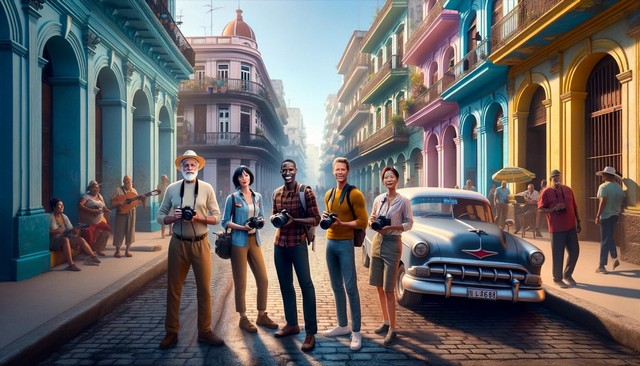Cuba Travel From US: Navigating the Regulations and Embracing the Culture
For many years, Cuba remained a forbidden fruit for most American travelers, shrouded in a mist of political complexities. While direct tourism remains prohibited under U.S. law, the landscape for travel has evolved, allowing Americans to visit the vibrant island nation under specific categories. Navigating these regulations is key to unlocking an unforgettable Cuban experience, rich in history, culture, and captivating charm.
The Current Landscape: Permissible Travel Categories
It's crucial to understand that general "tourism" to Cuba is still not allowed for U.S. citizens. Instead, travel must fall under one of 12 authorized categories. The most commonly used for individual travelers is "Support for the Cuban People."
 |
| (Picture: remote-expeditions.com) |
This category requires travelers to engage in a full-time schedule of activities that "result in meaningful interactions with individuals in Cuba" and are designed to "strengthen civil society in Cuba."
Other permissible categories include:
- Family Visits: For those with close relatives in Cuba.
- Journalistic Activity: For professional journalists.
- Professional Research and Professional Meetings: For those engaged in specific fields.
- Educational Activities: Including "people-to-people" exchanges, although the general license for this category was revoked, requiring specific authorization.
- Religious Activities: For those participating in religious programs.
- Public Performances, Clinics, Workshops, Athletic and Other Competitions, and Exhibitions: For participants and organizers.
- Humanitarian Projects: For those engaged in specific aid work.
- Activities of Private Foundations or Research or Educational Institutes: For authorized personnel.
- Exportation, Importation, or Transmission of Information or Informational Materials: For specific commercial activities.
- Certain Authorized Export Transactions: For those involved in trade.
Planning Your Trip: Key Considerations
Once you've identified your authorized travel category, careful planning is essential:
- Visas: U.S. citizens need a Cuban visa (often referred to as a "tourist card"), which can typically be obtained through airlines, visa service agencies, or at the airport before departure. Ensure your passport is valid for at least six months beyond your intended stay.
- Flights: Direct flights are available from several U.S. cities to Havana and other Cuban destinations. Booking with airlines that are familiar with the U.S. regulations regarding Cuba travel can simplify the process.
- Accommodation: While state-run hotels exist, staying in casas particulares (private homes offering rooms for rent) is highly recommended under the "Support for the Cuban People" category. This allows for direct interaction with Cuban families and injects money directly into the local economy.
- Financials: U.S. credit and debit cards generally do not work in Cuba due to the ongoing embargo. Travelers must bring enough cash to cover all expenses for their trip. Euros or Canadian dollars are often preferred for exchange into Cuban Convertible Pesos (CUC) or Cuban Pesos (CUP), although USD can also be exchanged. Be aware of the dual currency system, though the CUC is gradually being phased out.
- Insurance: Travel insurance, including medical coverage, is mandatory for all visitors to Cuba. This is often purchased with your flight ticket or upon arrival.
Embracing the Cuban Experience Under "Support for the Cuban People"
To genuinely adhere to the "Support for the Cuban People" category, your itinerary should focus on engaging with independent Cuban entrepreneurs and artists. This means:
- Dining at Paladares: Private restaurants run by Cuban families, offering authentic and often exquisite cuisine.
- Staying in casas particulares: As mentioned, this is a cornerstone of supporting local families.
- Visiting private art galleries and studios: Engaging directly with Cuban artists.
- Taking classes: Consider dance, music, or cooking classes offered by independent teachers.
- Learning about Cuban culture: Visiting community projects, and independent markets, and engaging in conversations with locals.
- Avoiding state-owned entities: While some interaction is unavoidable (e.g., airports), the spirit of the regulation is to minimize spending at government-run establishments.
What to Expect in Cuba
Cuba offers a captivating blend of history, vibrant culture, and resilient spirit. You can expect:
- Classic Cars: A living museum of immaculately preserved 1950s American cars.
- Music and Dance: The rhythm of salsa and son permeates the streets, with live music found in countless venues.
- Rich History: From colonial architecture to revolutionary sites, Cuba's past is ever-present.
- Warm Hospitality: Cubans are renowned for their friendliness and welcoming nature.
- Limited Connectivity: Internet access can be sporadic and expensive, encouraging a digital detox.
- Infrastructure Challenges: Be prepared for varying levels of infrastructure, particularly outside of major tourist areas.
Important Reminders for U.S. Travelers:
- Keep Records: Maintain detailed records of your itinerary and receipts to demonstrate your compliance with the chosen travel category, especially "Support for the Cuban People."
- Be Mindful of Regulations: The U.S. government can change its policies toward Cuba with relatively little notice. Always check the latest regulations from the Office of Foreign Assets Control (OFAC) before planning your trip.
- Travel Responsibly: Respect local customs, laws, and the environment.
Traveling to Cuba from the U.S. is a unique and enriching experience that goes beyond typical tourism. By understanding and adhering to the specific U.S. regulations, American travelers can responsibly explore this extraordinary island, connect with its people, and gain a deeper appreciation for its enduring spirit.

0 Response to "Cuba Travel From US: Navigating the Regulations and Embracing the Culture"
Post a Comment